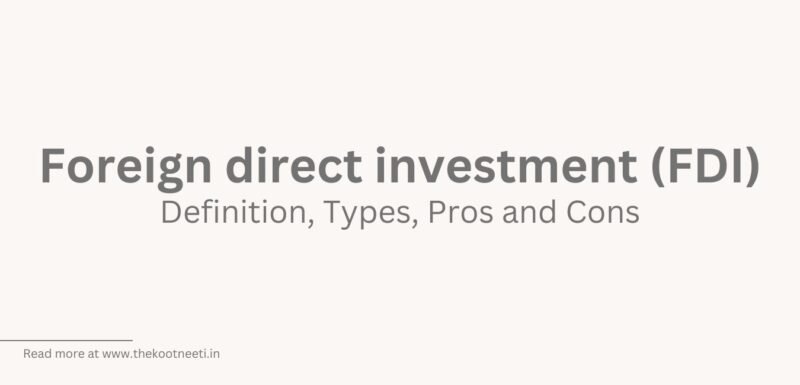Foreign direct investment (FDI): Definition, Types, Pros and Cons

Foreign direct investment (FDI) refers to investment made by a company or individual in a foreign country, in the form of establishing operations or acquiring assets in that country. FDI can take many forms, such as setting up a subsidiary or acquiring a local company, and it can involve a range of activities, such as manufacturing, marketing, research and development, and other business operations.
FDI is considered a key driver of economic growth and development, as it can bring new technologies, management practices, and capital to the host country. It can also create new job opportunities and contribute to the transfer of knowledge and skills.
However, FDI can also be controversial, as it can lead to changes in the domestic economy and can have distributional effects, such as job losses and wage stagnation in some sectors. As a result, many countries have policies in place to attract FDI, such as tax incentives, regulatory reforms, and other measures, while also seeking to manage the potential negative impacts of FDI.
Types of FDI
There are several types of foreign direct investment (FDI), and the specific form of FDI can depend on the goals and objectives of the investor, as well as the nature of the investment and the host country’s laws and regulations. Some examples of types of FDI include:
- Greenfield investment: This refers to the establishment of a new business or operation in a foreign country, such as building a new factory or setting up a new subsidiary.
- Brownfield investment: This refers to the acquisition or expansion of an existing business or operation in a foreign country, such as acquiring a local company or investing in the expansion of an existing facility.
- Mergers and acquisitions: This refers to the acquisition of a foreign company by a domestic company, or the merger of two or more companies from different countries.
- Joint ventures: This refers to the establishment of a new business or operation by two or more companies from different countries, in which the companies share ownership and control.
- Strategic alliances: This refers to the formation of a partnership between two or more companies from different countries, for the purpose of collaborating on a specific project or venture.
Overall, the specific type of FDI can depend on a variety of factors, including the goals and objectives of the investor, the nature of the investment, and the host country’s laws and regulations.
Pros and Cons of FDI
Pros:
- FDI can bring capital, technology, and expertise to the host country, which can lead to economic growth and development.
- It can create jobs and stimulate the local economy.
- It can increase competition in the host country, which can lead to improvements in efficiency and quality.
- It can help host countries integrate into the global economy and increase their access to international markets.
Cons:
- FDI can lead to the loss of domestic jobs if foreign companies choose to use cheaper foreign labor.
- It can lead to the concentration of wealth and power in the hands of a few large foreign companies.
- It can result in the exploitation of natural resources and environmental degradation if proper safeguards are not in place.
- It can lead to cultural imperialism if foreign companies impose their values and practices on the host country.


















